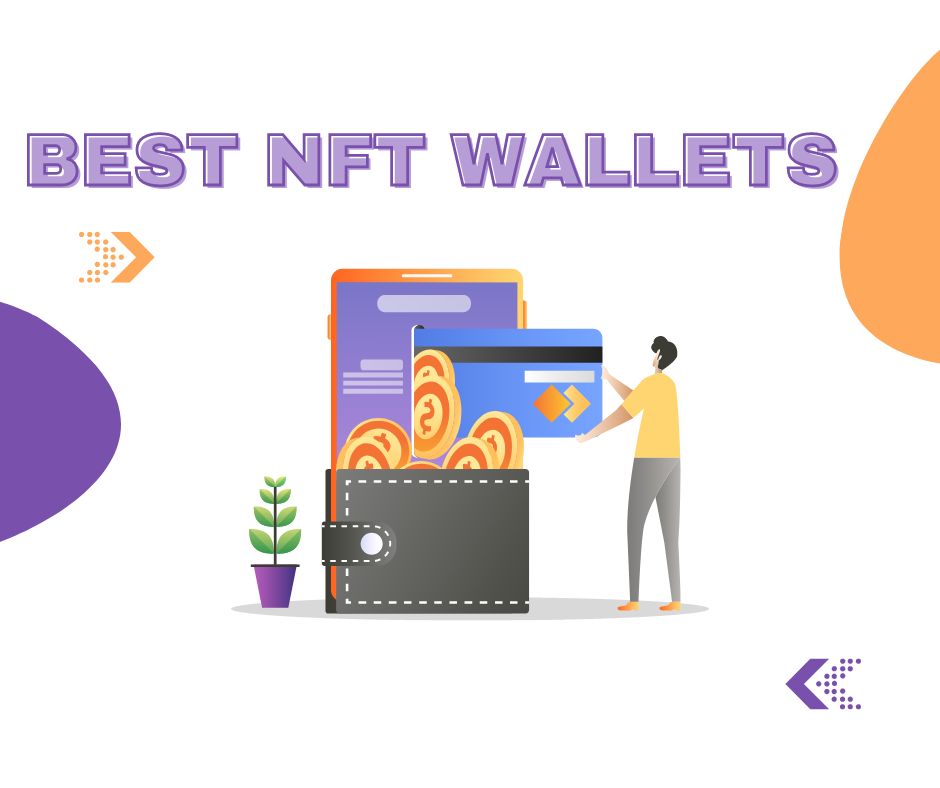10 Best NFT Wallets in 2023: You're well aware that the digital world is rapidly expanding. From cryptocurrencies to digital art, everything has started to resonate with the virtual vibe. That's where Non-Fungible Tokens (NFTs) come into play.
As these tokens can't be exchanged on a like-for-like basis, a robust and reliable wallet is a necessity to handle them.
Are you curious to know about the best NFT wallets of 2023? You're in luck! Here are the top 10 NFT wallets, their unique features, plus their pros and cons, all in one comprehensive guide.
Top 10 Best NFT Wallets in 2023
1. MetaMask
A fan-favorite, MetaMask is an Ethereum-based wallet. Supporting ERC-721 and ERC-1155 tokens, this browser extension is perfect for interacting with decentralized apps (DApps). It’s user-friendly and makes your NFT journey smooth.
Pros:
- Seamless integration with DApps
- A high level of security
- Open-source platform
Cons:
- Primarily supports Ethereum blockchain
- Requires technical know-how for optimal use
2. Trust Wallet
Trust Wallet offers a multi-chain platform, accepting numerous blockchains like Binance Smart Chain, Ethereum, Polkadot, and more. It has a sleek mobile interface and a DApp browser, plus built-in price tracking for your assets.
Pros:
- Multiple blockchain support
- Built-in price tracker
Cons:
- Mobile-only platform
- Less intuitive for beginners
3. Coinbase Wallet
You’ve heard of Coinbase, right? The exchange has an associated NFT wallet, perfect for both beginners and seasoned investors. It’s as safe as it gets, offering encrypted private keys that stay on your device.
Pros:
- User-friendly
- Backed by a reputable exchange
Cons:
- Limited blockchain support
- No in-built trading platform
4. Ledger
Looking for a hardware wallet? Ledger is your top bet. With Ledger, your NFTs are kept offline, providing an extra layer of security. The Ledger Live application facilitates easy interaction with Ethereum-based NFTs.
Pros:
- Enhanced security
- Support for numerous cryptos
Cons:
- Costly compared to digital wallets
- Limited to Ethereum-based NFTs
5. Rainbow Wallet
Rainbow Wallet's aesthetics and smooth UI are its main attractions. It offers an immersive experience while managing your NFTs, with vibrant visuals making your digital assets more enjoyable to navigate.
Pros:
- Unique, user-friendly interface
- Offers Ethereum Name Service (ENS)
Cons:
- Only supports iOS
- Ethereum blockchain limited
6. Trezor
Trezor, a hardware wallet like Ledger, provides offline storage for your NFTs. With an easy-to-use interface and top-notch security, Trezor maintains a fine balance between functionality and safety.
Pros:
- High-security level
- User-friendly interface
Cons:
- Pricier than most digital wallets
- Limited blockchain compatibility
7. Enjin Wallet
For gaming enthusiasts, Enjin Wallet offers the perfect NFT storage solution. It supports ERC-1155 tokens and provides an integrated marketplace for trading in-game items.
Pros:
- Built for gaming NFTs
- Integrated marketplace
Cons:
- Limited appeal for non-gamers
- Only the mobile version is available
8. Argent
Argent's smart contract-based security system sets it apart. This wallet offers simplicity and safety, with features like the 'Guardian' that lets you designate trusted contacts to help recover your assets.
Pros:
- Innovative security system
- No transaction fees
Cons:
- Limited to Ethereum-based NFTs
- Mobile-only platform
9. Math Wallet
Math Wallet's support for over 60 chains, including Polkadot, Cosmos, Binance, and Ethereum, has helped it carve a niche. It's both a mobile and a web wallet, giving you flexibility in access.
Pros:
- Broad blockchain support
- Multi-platform availability
Cons:
- Complex for beginners
- Some security concerns
10. Atomic Wallet
Rounding off our list is Atomic Wallet. It's a desktop wallet that provides a built-in exchange with over 300 coins. Despite not having a dedicated NFT interface, it supports all ERC-721 tokens.
Pros:
- Integrated crypto exchange
- Supports numerous cryptocurrencies
Cons:
- No dedicated NFT interface
- Less intuitive for NFT transactions
Remember, choosing the best NFT wallet largely depends on your individual needs. Whether you prioritize security, ease of use, or a dedicated NFT interface, there's a wallet on this list just for you. Embrace the digital revolution, and keep your NFTs secure with the best wallets of 2023. Good luck!
Q1: What is an NFT Wallet?
A1: An NFT Wallet is a digital wallet specifically designed to store and manage Non-Fungible Tokens (NFTs). These are unique digital assets that can represent a wide range of tangible and intangible items, from digital artwork to virtual real estate.
Q2: How does an NFT Wallet work?
A2: NFT wallets work by securely storing the private keys associated with your NFTs. These wallets interact with blockchain technology to enable you to manage, transfer, or sell your NFTs on various platforms.
Q3: What are the best NFT wallets in 2023?
A3: Some of the top NFT wallets in 2023 include MetaMask, Trust Wallet, Coinbase Wallet, Ledger, Rainbow Wallet, Trezor, Enjin Wallet, Argent, Math Wallet, and Atomic Wallet. Each of these wallets offers distinct features and supports various blockchains.
Q4: Is it safe to store NFTs in a digital wallet?
A4: Yes, it is generally safe to store NFTs in a digital wallet, provided you follow necessary security practices. This includes keeping your private keys private and using reliable and secure wallet platforms.
Q5: Can NFTs be transferred between wallets?
A5: Yes, NFTs can be transferred between wallets. However, the process may vary based on the wallets and blockchains involved. It's important to ensure that both the sending and receiving wallets are compatible with the specific type of NFT to successfully transfer.
Q6: Are hardware wallets better for storing NFTs?
A6: Hardware wallets like Ledger and Trezor offer an extra layer of security as they store private keys offline. However, they can be less convenient for regular trading or interactions with NFT marketplaces compared to software wallets. The choice between hardware and software wallets usually depends on your personal preference, trading frequency, and security comfort level.
Remember, it's important to thoroughly research and consider the pros and cons before deciding on the most suitable wallet for your NFTs.


